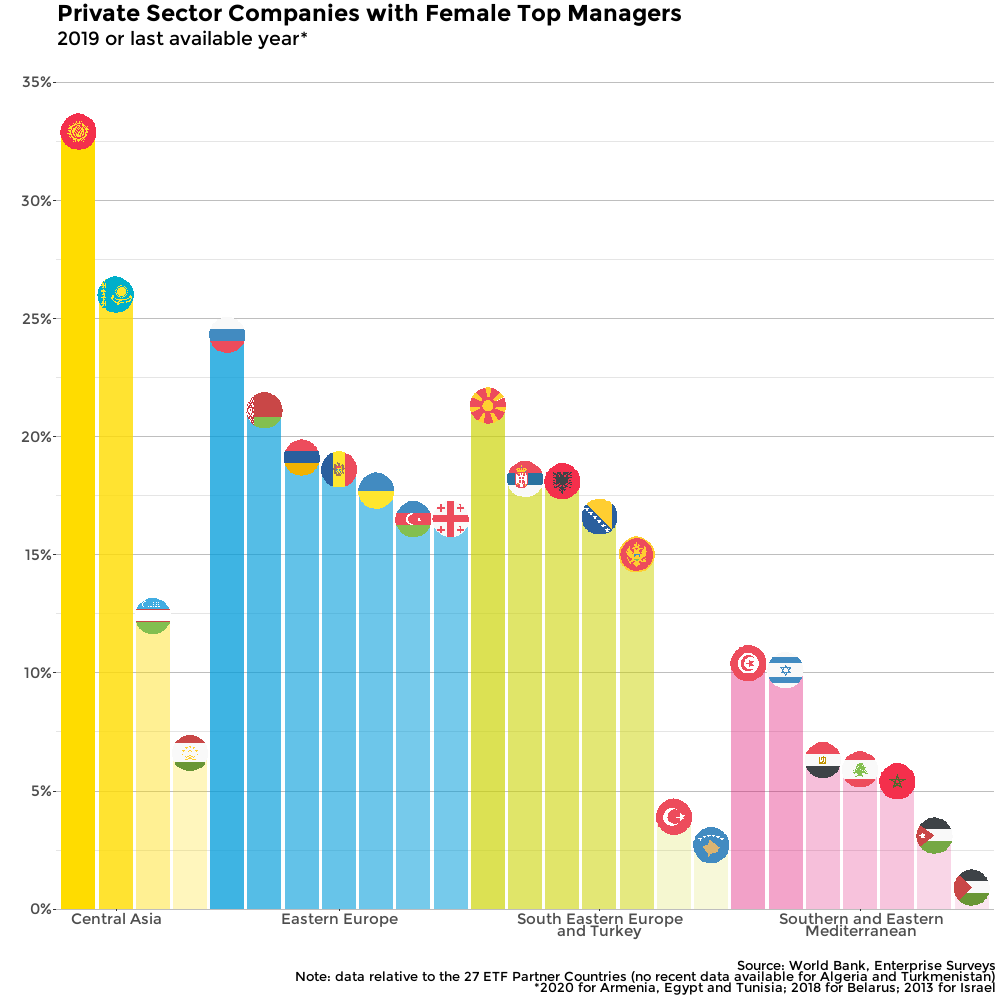
Skills support for Women’s Entrepreneurship to achieve more inclusive and prosperous societies
In line with the European agenda 2021, the Portuguese semester at the EU Council, and the new gender Action plan (GAP) III 2021-2025 setting the most recent agenda for gender equality and women’s empowerment in EU external action, the ETF is putting special focus on achieving social inclusion through education and learning.
Empowerment of women and girls is one of the crucial elements of the Sustainable Development Goals 2030 and a key contributor to economic growth and development. Many women, both in the European Union and in its neighbouring countries still face economic, legislative and social barriers to entering the labour market, entrepreneurship and self-employment despite studies that prove that the contribution of women’s employment and their participation in business creation and management are significant contributors to corporate growth and national competitiveness.
In line with the EU and global trends, female employment numbers are still low in the countries of the EU neighbourhood ;
The gap in business ownership and enterprise management is even more dramatic:


During the last decade, the ETF has been a co-author of evidence‑based policy assessments in three EU neighbouring regions, jointly with the European Commission, OECD and EBRD which resulted in the publication of the SME Policy Index Reports illustrating the state of play in women’s entrepreneurship development in 23 partner countries. The reports provide policy recommendations for institutions and decision makers on how to address the women’s entrepreneurship agenda in national and regional contexts. The ETF has also published a working paper “Training and support for women's entrepreneurship” highlighting challenges for women’s entrepreneurship development and presenting the ETF’s approach to the support of skills and competences of women for successful career development, self-employment and entrepreneurship.
The self-efficacy of women is an important part of the entrepreneurship key competence – a dynamic combination of skills, knowledge and attitudes. By acquiring this competence and developing it throughout their lives, women boost their self-confidence, which can enable them to move away from traditional jobs and lifestyle, increase their own and their families’ incomes and contribute to the well-being of society.
Re-addressing the gender gap
Although progress in societies and in legislation has been made to overcome gender disparity, barriers to entrepreneurship still remain and these include social-cultural factors. Structured career guidance for girls and boys – to promote a variety of career pathways from wage employment to self-employment and entrepreneurship - and legislative support are missing. Additionally, women more than men are still struggling to access capital for business development.
Growing awareness in institutions about these issues can help to resolve them. Many countries lack sex-disaggregated data necessary to design effective gender-responsive polices. Development of national statistical gathering and analysis is needed to address this issue. Moreover, reliable data can assist the ETF and other institutions and relevant stakeholders in giving input and making recommendations to policymakers to support more gender-sensitive actions.
Education and entrepreneurship training as enabling factors.
The ETF’s approach focuses on inclusive human capital policy and practice, targeting the specific needs of women to develop their entrepreneurial potential distinct from more general SME support measures and instruments. These are some of the critically important actions to support women’s entrepreneurship:
- Improving policy awareness and buying-in on the economic value of women’s entrepreneurship and its importance as a critical success factor for national competitiveness among the main national stakeholder groups.
- Ensuring that education, especially its sensitisation phases, and career guidance which are ‘gender and entrepreneurship sensitive’, becomes an important objective of education policies.
- Entrepreneurship key competence integrated with the curricula and teacher training in formal education and non- formal learning.
- Early exposure of learners to entrepreneurial success stories featuring both sexes to offset the domination of male role models in education and training curricula and practice.
- Training should be built on a thorough analysis of training needs, both prior and throughout women’s engagement into business.
The ETF’s approach is based on the constantly evolving understanding of the importance of women entrepreneurs for national economic development, competitiveness, growth and jobs in the ETF partner regions.
For more details on recommendations and actions, read our publication here.
For a focus on SME in neighbouring countries, the SME Policy Index Reports:
Countries of the Eastern Partnership region
The Western Balkans and Turkey
Mediterranean Middle East and North Africa
Our experts have been involved in interesting events on this topic recently: the Mediterranean Tech Women Week 2020 by Mujeres Tech and Womenpreneur-Initiative and TEBD Women Entrepreneurs Forum (November 2020).
Did you like this article? If you would like to be notified when new content like this is published, subscribe to receive our email alerts.